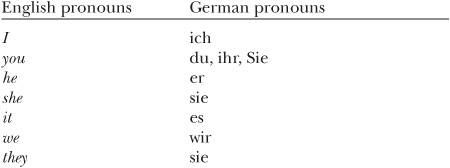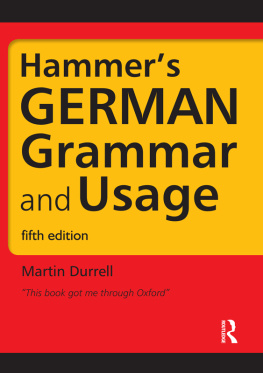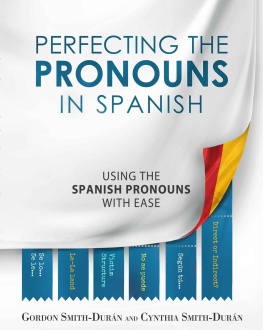PRACTICE MAKES PERFECT
German Pronouns and Prepositions
PRACTICE MAKES PERFECT
German Pronouns and Prepositions
Second EditionEd Swick

Copyright 2011 by The McGraw-Hill Companies, Inc. All rights reserved. Except as permitted under the United States Copyright Act of 1976, no part of this publication may be reproduced or distributed in any form or by any means, or stored in a database or retrieval system, without the prior written permission of the publisher. ISBN: 978-0-07-175384-5 MHID: 0-07-175384-2 The material in this eBook also appears in the print version of this title: ISBN: 978-0-07-175383-8, MHID: 0-07-175383-4. All trademarks are trademarks of their respective owners. Rather than put a trademark symbol after every occurrence of a trademarked name, we use names in an editorial fashion only, and to the benefit of the trademark owner, with no intention of infringement of the trademark.
Where such designations appear in this book, they have been printed with initial caps. McGraw-Hill eBooks are available at special quantity discounts to use as premiums and sales promotions, or for use in corporate training programs. To contact a representative please e-mail us at bulksales@mcgraw-hill.com. Trademarks: McGraw-Hill, the McGraw-Hill Publishing logo, Practice Makes Perfect, and related trade dress are trademarks or registered trademarks of The McGraw-Hill Companies and/or its affiliates in the United States and other countries and may not be used without written permission. All other trademarks are the property of their respective owners. TERMS OF USE This is a copyrighted work and The McGraw-Hill Companies, Inc. (McGraw-Hill) and its licensors reserve all rights in and to the work. (McGraw-Hill) and its licensors reserve all rights in and to the work.
Use of this work is subject to these terms. Except as permitted under the Copyright Act of 1976 and the right to store and retrieve one copy of the work, you may not decompile, disassemble, reverse engineer, reproduce, modify, create derivative works based upon, transmit, distribute, disseminate, sell, publish or sublicense the work or any part of it without McGraw-Hills prior consent. You may use the work for your own noncommercial and personal use; any other use of the work is strictly prohibited. Your right to use the work may be terminated if you fail to comply with these terms. THE WORK IS PROVIDED AS IS. McGRAW-HILL AND ITS LICENSORS MAKE NO GUARANTEES OR WARRANTIES AS TO THE ACCURACY, ADEQUACY OR COMPLETENESS OF OR RESULTS TO BE OBTAINED FROM USING THE WORK, INCLUDING ANY INFORMATION THAT CAN BE ACCESSED THROUGH THE WORK VIA HYPERLINK OR OTHERWISE, AND EXPRESSLY DISCLAIM ANY WARRANTY, EXPRESS OR IMPLIED, INCLUDING BUT NOT LIMITED TO IMPLIED WARRANTIES OF MERCHANTABILITY OR FITNESS FOR A PARTICULAR PURPOSE.
McGraw-Hill and its licensors do not warrant or guarantee that the functions contained in the work will meet your requirements or that its operation will be uninterrupted or error free. Neither McGraw-Hill nor its licensors shall be liable to you or anyone else for any inaccuracy, error or omission, regardless of cause, in the work or for any damages resulting therefrom. McGraw-Hill has no responsibility for the content of any information accessed through the work. Under no circumstances shall McGraw-Hill and/or its licensors be liable for any indirect, incidental, special, punitive, consequential or similar damages that result from the use of or inability to use the work, even if any of them has been advised of the possibility of such damages. This limitation of liability shall apply to any claim or cause whatsoever whether such claim or cause arises in contract, tort or otherwise.
Contents
Introduction
Pronouns and prepositions are often undervalued and considered insignificant aspects of language study.
They are even sometimes entirely overlooked. But pronouns and prepositionswhether English or Germanplay an important role in language. In fact, many people study German for years and become masters of conjugations and declensions but continue to have only a basic grasp of the many uses of pronouns and prepositions. This book will help to overcome this neglectful attitude. It puts pronouns and prepositions under a bright light to illuminate their importance in language learning and to provide you with new insight into their mechanics. You will find detailed explanations of their functions and numerous examples to add clarity to those functions.
You will also find an abundance of exercises for practicing the new concepts you learn. The exercises appear in different formats in order to give you practice with pronouns and prepositions from different angles. Some of the exercises ask you to select the word that completes a sentence correctly. Others ask you to complete a sentence with any appropriate word or phrase of your choosing. Still others ask you to write an original sentence that includes a specific phrase. There is an Answer Key at the back of the book so that you can track your progress.
Knowing how to identify pronouns and prepositions is only part of the story. Knowing how they function is also necessary. Knowing where and when pronouns and prepositions are used is another key to unlocking their secrets. It is important to have the whole story, because pronouns and prepositions are more than just little words that adorn sentences. They help to make sentences flow and to sound interesting and meaningful. This book will guide you through the whole story.
Take advantage of the contents of this book and increase your ability to use pronouns and prepositions effectively and accurately. This is an opportunity to bring your German skills to a higher level.
PART I
PRONOUNS
You already know that
pronouns replace nouns in a sentence, and you are certainly familiar with the personal pronouns in German:
ich,
du,
er,
sie,
es,
wir,
ihr, and
Sie. But the story about pronouns continues beyond the personal pronouns. For one thing, the variety of pronouns in German is rather large. They range from personal pronouns, which everyone identifies with ease, to possessive pronouns, demonstrative pronouns, relative pronouns, reflexive pronouns, reciprocal pronouns, and others.
These types of pronouns may be unfamiliar to you now, but once you have experience with these pronouns and adequate practice, they will make sense to you, and you will gain the skill to use pronouns more effectively. In this section of the book, you will be introduced to the various types of German pronouns. They will be described for you, and they will be illustrated with examples. Then you will have the opportunity to practice with them in a variety of exercises. As a result, you will have developed a better understanding of these pronouns and will have increased your effectiveness in using them.
Unit 1
Pronouns in the Nominative Case
The English personal pronouns used as the subject of a sentence are equivalent to the German nominative case pronouns, which are used as the subject of a German sentence.
 Next page
Next page










 Copyright 2011 by The McGraw-Hill Companies, Inc. All rights reserved. Except as permitted under the United States Copyright Act of 1976, no part of this publication may be reproduced or distributed in any form or by any means, or stored in a database or retrieval system, without the prior written permission of the publisher. ISBN: 978-0-07-175384-5 MHID: 0-07-175384-2 The material in this eBook also appears in the print version of this title: ISBN: 978-0-07-175383-8, MHID: 0-07-175383-4. All trademarks are trademarks of their respective owners. Rather than put a trademark symbol after every occurrence of a trademarked name, we use names in an editorial fashion only, and to the benefit of the trademark owner, with no intention of infringement of the trademark.
Copyright 2011 by The McGraw-Hill Companies, Inc. All rights reserved. Except as permitted under the United States Copyright Act of 1976, no part of this publication may be reproduced or distributed in any form or by any means, or stored in a database or retrieval system, without the prior written permission of the publisher. ISBN: 978-0-07-175384-5 MHID: 0-07-175384-2 The material in this eBook also appears in the print version of this title: ISBN: 978-0-07-175383-8, MHID: 0-07-175383-4. All trademarks are trademarks of their respective owners. Rather than put a trademark symbol after every occurrence of a trademarked name, we use names in an editorial fashion only, and to the benefit of the trademark owner, with no intention of infringement of the trademark. 